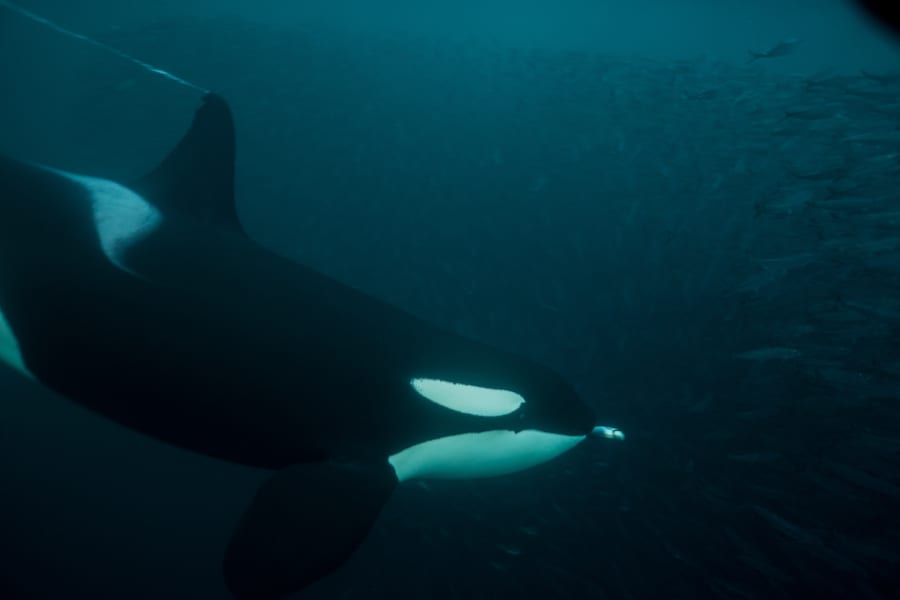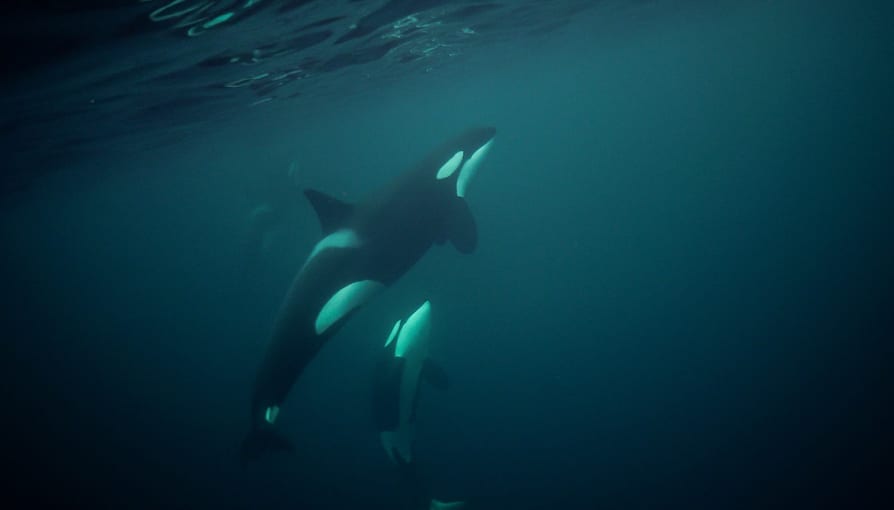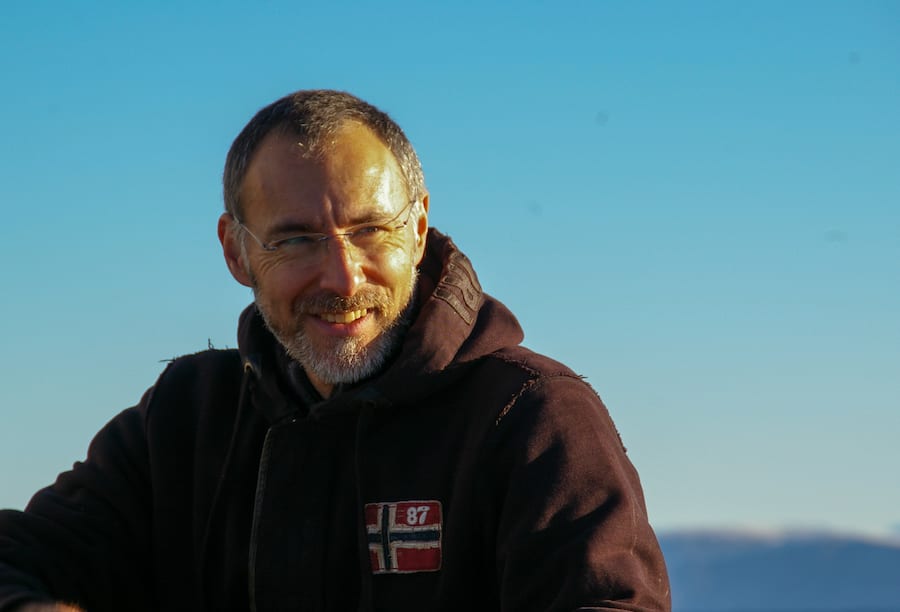In part one of this two-part orca series, animal advocate Kat Pirelli-Zucchetta speaks to Pierre Robert de Latour – aka the Orca Whisperer.
Pierre Robert de Latour’s career may have originated in biochemistry, but he has spent the past 20 years working with orcas, garnering more than 6,000 dives under his belt. Today, he is known internationally as an expert on orcas, a TedX speaker, and author of the best seller Frère des orques.
In exploring the European coast throughout his 40-year career, Pierre – aka the Orca Whisperer – has gained a deep understanding of and unique experience with orcas, various fish species, seals and large whales.
He founded the USEA (Undersea Soft Encounter Alliance), a professional network that established safe methodology on responsible encounters with marine mammals while respecting their wild nature, and dived with Strømsholmen in Norway.
He has also been involved in the production of various documentaries and was the focus of one episode of the BBC’s ‘Great Ocean Adventures’.
Monaco Life: What prompted you to start working with and learning more about orcas?
Pierre Robert de Latour: My first encounter with orcas in Norway was during an international spearfishing competition. This short encounter changed the course of my life. Two days later, I won the championship and I was able to pay for my first dive with orcas. I was not the first diver to swim with the orcas, but I was the first to do it in a wet suit. I have been a safety diver for many years. My knowledge mainly comes from my own observations of orcas in the field.
Can you describe the feeling you have when diving with orcas?
It is an incredible experience and I still find it difficult to believe what is happening to me when I am diving. Watching orcas from the deck of a boat is wonderful, we can admire their grace and ease in the water. But when we have the chance to meet them underwater, when they approach so closely that we can clearly see their eye, we feel analysed, studied, scrutinised … as if they have the power to access our deepest emotions. We become someone else; they change us. This feeling becomes addictive, but it is always the orcas who choose. We can only rely on their goodwill. I have never missed a season, a single week or even a single day in these past 22 years of expedition. An adventure with orcas is beautiful. But the human adventure with the crew is also important. We are a united group, a family.

Orcas are also referred to as “killer whales”, but have you ever known an orca to become aggressive or to have killed anyone in the wild?
Over two decades, I have accumulated more than 6,000 underwater encounters with orcas and guided more than 1,000 passengers. I never once observed behaviour that could be a warning or a threat. Today, diving with orcas has become an activity that is spreading all over the world. Despite this, orcas have never attacked a human being. There are two or three rumours circulating about a possible attack, but they could not be verified. So, none have been officially reported. I never use the name “killer whales” for orcas. This is incorrect and contributes to the false image – a bad image – of orcas. Believe me, when you dive with them, you tend to call them sea pandas.
In one of your videos, you talk about the human brain’s limbic system which is responsible for emotions and the orca’s brain which has an addition to this area called the paralimbic system. What kind of impact do you think this has on the orca’s emotions based on your many observations?
Orcas live in family groups led by the oldest female, called the “Matriarch”. Her group is made up of all her descendants: sons, daughters, grandchildren, granddaughters… until the last generation of the group. We know that the bonds between the members of the group are very strong. When we see a female and her young, we feel all the love of a mother for her child. Sometimes the baby dies within the first few weeks. The mothers are then observed pushing the corpse of the newborn for days, even weeks, like a mourning ritual. She is grieving the loss and the pain seems to be immense. We have sometimes seen orcas caught in Norwegian fishing nets. The whole family stays around, visibly very agitated. We perceive through this nervousness the emotional attachment between the members of the group. We also perceive it during moments of socialisation. Orcas are highly emotional creatures. And the constitution of their brain and the presence of their paralimbic lobe is certainly for something.

How intelligent do you think orcas really are?
How does one describe intelligence? Are we humans intelligent creatures? Should we compare orcas’ intelligence to our intelligence? There are many things we don’t know about orcas. We know that they communicate, that they speak to each other inside the group and from group to group, but so far, we are not able to understand what they say. My feeling is that our brain is not capable of understanding this extraordinarily complex communication that they use. I believe that with the power of Artificial Intelligence, we will be able to understand them one day. Then, we will understand how truly intelligent they are. But so far, we can say that they have a high social intelligence, a high environmental intelligence, and after all these years, my feeling is that it goes much further.
How are orcas threatened by humans and what would be the number one thing we can do to help them?
The first measure to be implemented as quickly as possible is the fight against global warming. The consequences of warming will be terrible for all ecosystems. It is urgent. If we allow warming to deplete the first links of the food chain, this will have dramatic consequences on the populations of the apex predator: the orca.
But it is not the only threat – overfishing, pesticides pollution, micro and macro plastics, noise pollution due to maritime traffic and petroleum research are also major threats. They all originate from human activity. Plastics and especially pesticides are deadly poisons for all forms of life. There is an urgent need to ban their use. We absolutely must change our agricultural models as quickly as possible to achieve production that respects nature.

Do you think it is possible to successfully reintroduce orcas into the oceans?
Yes, I am convinced that certain captive orcas can be returned to their natural environment after a rehabilitation program. Not all, but for the most part, even those who were born in captivity, it is possible to rehabilitate them. In the wild, orcas hunt first and then they play. In captivity, the trainers have reversed this natural process. A rehabilitation program must make it possible to return to the natural state. Of course, marine parks say the opposite, but there are many examples of successful rehabilitation programs, including Springer, Ric O’Barry and the Dolphin Project, and the rehabilitation of the hundred orcas and belugas from the “whale jail” in Russia.
Do you have any final words for our readers?
Captain Paul Watson says: “If the oceans die, we will die”. He is right. By protecting the oceans, we protect ourselves and we protect the future of our children. It is our choices that make us respect the oceans and the creatures that live there. We can all do something. We will need everyone’s help.
You can follow Pierre Robert de Latour on Facebook: https://www.facebook.com/TheOrcaWhisperer/
And Linkedin : https://www.linkedin.com/in/pierre-robert-de-latour-the-orca-whisperer-aa47a227/
Learn more about orcas on his Youtube channel: https://www.youtube.com/channel/UCIfYHdTHSUW573zUKYgkkvg?view_as=subscriber
